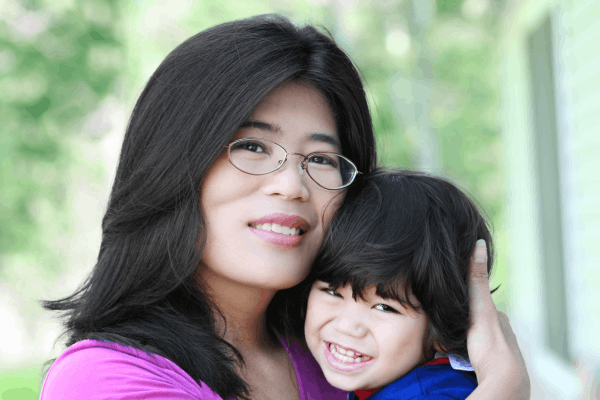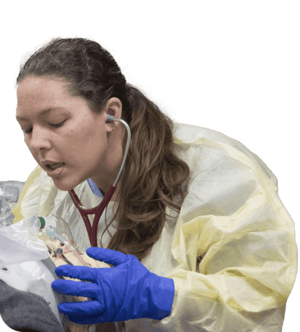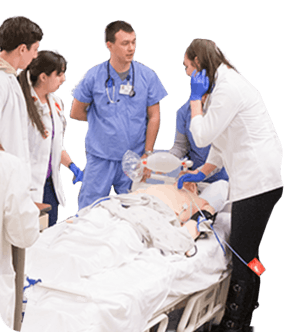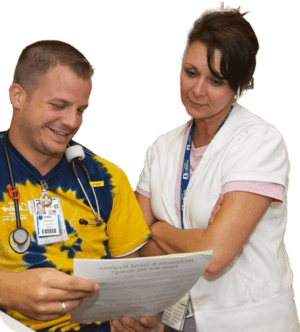Clinical Pediatric Neuropsychology Postdoctoral Fellowship
This fellowship works with these departments and clinics:
NeuroDevelopmental Science Center, Neurobehavioral Health
We offer a 2-year fellowship program in clinical pediatric neuropsychology through our membership in the Association of Postdoctoral Programs in Clinical Neuropsychology (APPCN). We have 2 fellowship positions in the Division of Neurobehavioral Health within the NeuroDevelopmental Science Center.
As a fellow, you will receive clinical training with patients with diverse neurologic and neurodevelopmental conditions that span a wide age range from newborn to young adult. You will participate in a variety of didactic activities, including case conferences, neuroanatomy review course, and neurobehavioral seminar. You also will teach/supervise psychometric technicians and graduate students, as well as contribute to, or initiate, research under the mentorship of faculty.

What They‘re Saying…
“The autonomy with guidance that is provided by the attendings allowed me to develop management plans and build strong relationships with my patients and their families. The support team of APPs, social workers, psychologists, pharmacists, nurse clinicians (and many more) are also very invested in the education of the fellows, and this team really does make the sometimes long hours more enjoyable as we are finding our way through fellowship.”
— Matthew Henderson, MD, Hematology-Oncology Fellowship
Akron Children’s was founded on the principle of serving the needs of our community. Within our doors, this means treating all children as if they were our own, and turning no child or family away based on their ability to pay. In the community, this means improving access to healthcare services for children and families, enhancing public health, advancing medical or health knowledge, and reducing the burden of government or other community efforts.
Fellowship Training Goals and Objectives:
The mission of our program is to provide an advanced level of clinical, didactic, and academic training in the recognized specialty practice of Pediatric Clinical Neuropsychology. At the completion of the fellowship, residents will be ready to be licensed as a psychologist and begin the board certification process of the American Board of Professional Psychology (ABPP) in Clinical Neuropsychology.
Entry Requirements
Successful completion of an APA/CPA accredited doctoral education and training program as well as an APA/CPA accredited internship that includes substantial training in clinical neuropsychology. Residents must obtain their doctoral degree prior to beginning the Fellowship.
Program components
- Development of advanced skills in the neuropsychological evaluation and treatment of pediatric patients, and consultation to patients/families and professionals sufficient to practice on an independent basis
- Development of advanced understanding of brain-behavior relationships. Residents organize and teach a medical neuroanatomy course and participate in applied seminars, advanced case conferences and mock ABPP exams.
- Participation in scholarly activity, e.g., submission of a study or literature review for publication, presentation, or submission of a grant proposal or outcome assessment (one per year). Residents maintain the Neuropsychology service database that comprises all patients seen for evaluation, scores on assessment, and medical variables to support any archival or new research projects. Residents are listed as co-investigators and are included in all IRB activities and approvals.
- Participation in pedagogical activities, (e.g., teaching contributions to Behavioral Neuroscience Seminar, Neuroanatomy Review, facilitation of other NDSC or psychology education programs), and opportunities for supervision of a psychology extern or psychometrist.
Program structure
This is a two-year Fellowship. Three days (60%) of the postdoctoral resident’s week is spent engaged in providing clinical service, including assessment and treatment activities. The remaining two days (40%) are spent in research, departmental meetings, and educational activities.
The Division of Neurobehavioral Health provides neuropsychological assessment of pediatric inpatients and outpatients drawn from the hospital's departments of pediatrics, behavioral health, neurosurgery (including epilepsy surgery team), rehabilitation, genetics, neurology, cardiology, developmental-behavioral pediatrics, endocrinology, hematology/oncology, and sports medicine, as well as from outside referral sources. These referrals span the entire list of neuropathological conditions such as cerebrovascular disorders, congenital heart defects, brain tumors/non-central nervous system cancers, epilepsy, traumatic brain injury, hydrocephalus, craniosynostosis, lead exposure, premature birth, in-utero exposure to teratogens, neuromuscular disorders, neurocutaneous disorders, ADHD, learning disabilities, developmental disorders and other medical populations.
At the end of the program, you will:
- Undergo a formal evaluation to indicate advanced skills in pediatric neuropsychological evaluation, treatment and consultation
- Be eligible for licensure or certification for the independent practice of psychology
- Be eligible for board certification in clinical neuropsychology by the American Board of Professional Psychology

Kathleen Hassara, PsyD
Pediatric Neuropsychologist
We are accepting applications for two positions in the 2022-2024 training cycle.
To be eligible for our fellowship, you must have completed APA-accredited doctoral and internship programs, including an internship that includes substantial training in clinical neuropsychology. Our postdoctoral training program is a member of the Association of Postdoctoral Programs in Clinical Neuropsychology (APPCN; The Clinical Neuropsychologist, 1993, 7, 197-204) and adheres to the Houston Conference (HC) standards (Archives of Clinical Neuropsychology, 1998, 13, 160-166) for specialty training in clinical neuropsychology. The mission of APPCN is to offer the highest quality competency-based residency training in clinical neuropsychology with an emphasis on preparation for future specialty board certification through the American Board of Professional Psychology/American Board of Clinical Neuropsychology (ABPP/ABCN).
Application Deadline:
The deadline for receipt of all application materials to our program is January 7, 2022. Electronic submission of all application materials via email is preferred. Three letters of recommendation (directly from referees), official graduate transcript, a cover letter of interest, APPCN training verification form, and current CV are required. This program will be participating in the APPCN resident matching program and will conform to its published schedule of dates. Start date is typically July-August, although arrangements can be made for later start dates as needed.
To Apply:
Send a CV, a statement of interest and goals, three letters of recommendation (directly from referees), a completed APPCN verification form, and official graduate transcript to:
Erica Montague Krapf, Ph.D., ABPP
Board Certified Clinical Neuropsychologist
Director, Post-Doctoral Fellowship in Pediatric Neuropsychology
NeuroDevelopmental Science Center
Akron Children’s
Considine Professional Building, 4th floor
215 W. Bowery St.
Akron, OH 44308
ekrapf@akronchildrens.org (electronic submission preferred)
Phone: 330-543-4894
Fax: 330-543-6045
Or
Michelle Burgner
Fellowship Coordinator
Akron Children's
One Perkins Square
Akron, OH 44308
mburgner@akronchildrens.org
Year 1
- Major rotation in pediatric neuropsychology
- Graduate Medical Education curriculum as needed
- Twenty-four hours of assessment per week are required. These typically consist of three outpatient evaluations per week and one to two inpatient evaluations per month; Residents conduct their own testing on one of these per week.
- Psychotherapy/intervention cases according to Resident’s interests that could involve cases from outpatient rehabilitation including cognitive rehabilitation therapy
- 2 minor elective rotations over the course of the year (see below)
- Submission of a small study/abstract (e.g., archival or part of faculty members’ research program) or literature review for presentation and publication in the first year. Outline of original research project, grant proposal or outcome assessment written in first year and carried out in second year. Presentation at national or international meetings is encouraged and supported.
Year 2
The composition of this year depends on the resident's clinical interests and career trajectory. This additional year could be utilized for further clinical subspecialization.
- Continued major rotation in pediatric neuropsychology
- Two minor elective rotations over the course of the year
- Conduct and complete original research including paper submitted for publication
- Continue psychotherapy patient caseload or devote more time to the neuropsychological consultation service.
Clinical
Major Rotation:
- Pediatric Neuropsychology Clinic (Outpatient and Inpatient)
Elective Rotations:
- Rehabilitation Psychology
- Headache Clinic/Pain Biofeedback
- Neurology Clinic
- School Success Program
- Parent Child Interaction Therapy (PCIT)
- Comprehensive Behavioral Intervention for Tics and Tourette’s Clinic (CBIT)
- EEG Clinic
- Neuroradiology Clinic
- Neurosurgery Clinic
- Neurogenetics Clinic
- Early Childhood & Autism Clinic/Developmental Pediatrics Clinic
- Down’s Syndrome Clinic
- Turner’s Syndrome Clinic
- Epilepsy Surgery Program
- Neuromuscular Program
- Neonatal Follow-up Clinic
- Neuro-Oncology Clinic
- Lead Clinic
- Neurofibromatosis Clinic
- Tuberous Sclerosis Clinic
- Medical Coping Clinic
Research opportunities
Research is an important component of this residency, with residents expected to devote 10-20% of their time in order to take advantage of the rich research opportunities provided within the educational and research programs of the NDSC. This can be accomplished through a variety of means including archival studies and involvement within current IRB research protocols. Some of the research opportunities are detailed below in the selected faculty section.
Educational activities (Both years)
Seminars:
Professional Development Seminar (required) – this seminar occurs weekly and is given in conjunction with the APPIC-Member Pediatric Psychology Fellowship. Topics are generated, evaluated, and updated each year based on competency requirements, Residents’ needs, and timeliness/relevance for their professional development. The speakers involve a rotation of faculty presenters and guest speakers as well as an opportunity for each Resident to present job talks and research projects for supportive critique from and discussion with faculty. (1 hour)
Neuroanatomy Review Series (required) – this series occurs weekly for the first six months of each year of the Fellowship. In the first year, residents present with relevant faculty on different systems of Central Nervous System (CNS) to all trainees, including neuropsychology externs, psychology externs, Pediatric Psychology Residents, Psychiatry Residents, and Developmental Behavioral Pediatric Residents. In the second year, Residents take more responsibility for each presentation and lead the discussion. (1 hour)
Behavioral Neuroscience Seminar (required) – this weekly Seminar replaces the Neuroanatomy Review Series in the last six months of the training year. Each year topics are chosen to provide relevant information about different CNS disorders, and the talks are presented by faculty or guest speakers. Residents are participants unless there is a specific topic that they would like to present to all trainees. (1 hour)
Pediatric Neuropsychology Case Conference (required) – this hour long, weekly didactic involves case presentation done by fact finding method as a mock group oral exam in preparation for ABPP Certification in Clinical Neuropsychology. However, multiple disciplines participate and contribute to the discussion. Many of the cases reflect the application of topics presented in the Neuroanatomy Series and Behavioral Neuroscience Seminar. Residents are participants in their first year and the first part of the second year. In the last six months of the second year, the Residents present with a neuropsychology faculty member. (1 hour)
Clinical Neuropsychology Intensive Seminar (required) – this monthly seminar focuses on specific areas of neuropsychology (lifespan) to ensure that all Residents have competency in knowledge that will be assessed on the written Clinical Neuropsychology ABPP exam and on the yearly Residency Exam (produced by APPCN). Topics have included dementia, psychology of aging, advanced statistics, advanced report writing, psychometrics in neuropsychology, cultural competency, and neuroimaging. (1 hour)
Schwartz Rounds (optional but encouraged) -this quarterly offering is based on compassionate caregiving and offers a hospital-wide structured forum where all staff, clinical and non-clinical, come together regularly to discuss the emotional and social aspects of working in healthcare. The purpose of Rounds is to understand the challenges and rewards that are intrinsic to providing care, not to solve problems or to focus on the clinical aspects of patient care. (1 hour)
Pediatric Grand Rounds (as relevant) – Grand Rounds occur monthly and are open to all Department of Pediatrics physicians, advanced practice providers, psychologists, and psychology/neuropsychology trainees at the hospital. (1 hour)
Cleveland Clinic Department of Psychiatry Grand Rounds (as relevant) – these Grand Rounds occur quarterly and are held jointly with Cleveland Clinic Department of Psychiatry. Topics range from lifespan behavioral health disorders and evidenced-based treatment to ethical and legal issues associated with behavioral health practice. (1.5-hour)
Neuroradiology Rounds (as desired) – optional attendance and observation are encouraged and open to all Akron Children’s Medical Staff and are presented by the Neuroradiology Department. Noon conferences are typically given by a resident or attending. Resident-driven morning conferences are held weekly for an hour. Approximately, once a month, pediatric radiology lectures are given by faculty at Akron Children's lasting a half day.
Courses:
Graduate Medical Education Curriculum (as needed) – ACGME at Akron Children’s and North East Ohio Medical School (NEOMED) offer research courses, wellness activities, professional development seminars, and support meetings. All Residents have opt-out confidential counseling offered free of charge.
Clinical activities:
Clinical activities are supervised service delivery experiences that promote the development of clinical interview skills, case conceptualization, neuropsychological test administration and scoring, neuropsychological evaluation report writing, communication with interprofessionals or agencies, intervention, and verbal communication of results and recommendations to families and patients. These activities are completed by direct clinical service to patients aged four weeks to approximately 26 years of age with known or suspected CNS disorders or diseases that impact CNS functioning. Occasionally, there is opportunity for involvement in cases with older adults with mitochondrial disorders or white matter disease given the lifespan approach of some supervisors. Other clinical activities include participation in telehealth intake and service delivery, consultation with school personnel via virtual meetings, observation of depositions, psychotherapy caseload (in person and telehealth).
Teaching requirements
The Resident makes regular teaching contributions to the weekly Neuroanatomy Review series. In the first year, Residents present with relevant faculty on different systems of Central Nervous System (CNS) to all trainees. In the second year, Residents take more responsibility for each presentation by adding to or creating the PowerPoint and leading the discussion. There are also opportunities for participation on the Neurodevelopmental Science Center’s Research and Education Committee, leading a journal article review conference with trainees or other providers, and educating families on resources.
Supervision
Supervision is an interactive educational experience between the resident and the supervisor that is (a) evaluative and hierarchical, (b) is developmental, (c) extends over time, and (d) simultaneously enhances the professional functioning of the trainee and monitors the quality of health service neuropsychology services. The resident meets individually for formal/regularly scheduled and face-to-face supervision on a weekly basis with a clinical supervisor for at least two hours per week and daily for informal supervision as the case(s) dictates or need arises. The Resident initially observes the supervisor in all activities of patients care (e.g., intake or clinical interview, feedback with families, consultation with other healthcare providers, billing, documentation in the electronic medical record [EMR], office procedures) during the first year of the Fellowship. During the second year of the fellowship, the resident gradually begins to perform these activities under the direct observation of the supervisor and then moves to more independent service provision under indirect supervision while the supervisor is still onsite and accessible. When a Resident has multiple supervisors, the minimum of one hour per week per supervisor is met. Neuropsychology residents do not bill for services or complete documentation in the EMR. The Resident is not used to meet clinical service goals of the supervisors or the program. The Resident also meets regularly at least once per month with a research supervisor and/or minor rotation supervisor. There are also at least four hours of structured educational activities per week and group supervision. There are also opportunities for umbrella training and work supervision of neuropsychology externs and psychometrists, respectively. All supervisors are on the Akron Campus of Akron Children’s and are full-time at least 40 hours per week.
Expectations of residents
Minimal Clinical Expectations
The primary training method of the fellowship is experiential (i.e., learning via delivery of clinical services). This experiential training includes socialization into the profession of neuropsychology (through supervision, training seminars, role modeling, co-interviews and feedbacks, and observation during interdisciplinary team meetings) and is augmented by other appropriately integrated modalities, such as mentoring, didactic exposure, observational/vicarious learning, and supervisory or consultative guidance. Weekly expectations are based on 1.0 FTE, with variability for Residents at different levels of clinical appointment.
Residents work five days per week. Hours worked per week vary but are generally 40-45, depending on case load, special interests, and research expectations. Residents are considered hospital employees and must follow all policies and procedures of the hospital.
Satisfactory completion of the postdoctoral training program meets postdoctoral supervised practice requirements for licensure and for early acceptance for ABPP (bypass credentials review) written examination due to the APPCN status of the Fellowship.
Professional Conduct
Residents are expected to conform to the highest standards of professional and ethical conduct in the execution of their duties. They are bound by the American Psychological Association’s Ethical Principles of Psychologists and Code of Conduct, Ohio State Psychology Law and Rules, and the policies and procedures of Akron Children’s. A Resident may be dismissed because of gross violations of the law or of the APA Code of Ethics. Dismissal will occur only after the completion of appropriate grievance and/or due process procedures.
It is important to note that Ohio Psychology Law and Rules state that the APA code of ethics “shall be used as aids in resolving ambiguities…” BUT “…these rules [Ohio’s rules]…. shall prevail whenever any conflict exists between these rules and the APA code of ethics.” Therefore, you must become familiar with the stipulations regarding professional conduct in the Ohio Psychology Law & Rules.
As a clinical staff member of Akron Children’s, the Resident is subject to all hospital administrative and clinical care policies. The Resident is considered a full-time employee of Akron Children’s and is subject to all personnel policies of Akron Children’s.
Confidentiality
The Resident is expected to understand and comply with federal and state laws and rules regarding use of confidential information. Confidentiality is defined not simply as a legal necessity but also as an integral component of the client-professional relationship. The Resident is expected to behave in ways that fully conforms with APA and Ohio Board of Psychology standards for the protection of every client’s right to confidentiality.
Psychology License
Fellows are expected to obtain a psychology license at the conclusion of training.
Post-Doctoral Fellowship Stipends (effective July 1, 2025)
PL-1 – $68,589
PL-2 – $69,970
Vacation
House officers are granted 3 weeks of vacation or 15 customary working days.
Conference Time
Fellows are entitled to 5 days of conference time each year for medical conventions and courses outside the hospital.
Educational Allowance
Fellows are provided $1,200 annually for use toward medical-related journals or books, conferences, and license renewals.
Research and Scholarship Travel
The Department of Pediatrics encourages and supports investigator-initiated research by subspecialty fellows. Therefore, the Department supports research-related travel when the fellow is in good academic and professional standing, and when prior written approval of the program director is documented. All hospital policies relating to travel must be followed.
Although the policy relates to presentation at a national forum, requests for support for presentation at a regional forum are considered on a case-by-case basis. The funds can be requested once a year, for one conference.
Professional Liability
Professional liability insurance is provided by the hospital.
Health Benefits
Fellows and their dependents are eligible to enroll in the hospital’s health, dental, and vision insurance programs. Costs are shared between the fellow and the hospital.
Parking
A key access card for convenient parking is provided at no charge.
Lab Coats
One embroidered lab coat is provided if desired.
Relocation expenses
The hospital provides reimbursement for initial relocation expenses, up to $1,000, subject to current tax laws.
Posters and Presentations
Pulsipher, D.T., Fleckenstein, A.N., Krapf, E.M., & Stanford, L.D. (February 2021). Latent profile analysis of neuropsychological performance in youth and young adults with multiple concussions. Poster presented at the International Neuropsychological Society virtual annual meeting, Portland, OR.
Hassara, K.E., Hammer, A., Krapf, E.M., Schneider, B.M., Stanford, L.D., & Pulsipher, D.T. (February 2020). Cognitive phenotypes in pediatric genetic generalized and localization-related epilepsies. Poster accepted for presentation at the International Neuropsychological Society annual meeting, Denver, CO.
Schneider, B.M., Krapf, E.M., Hassara, K.E., Stanford, L.D., & Pulsipher, D.T. (February 2020). Neurodevelopmental implications of heterotaxy syndrome: A multi-case study. Poster accepted for presentation at the International Neuropsychological Society annual meeting, Denver, CO.
Pulsipher, D.T., Fleckenstein A.M., Stanford, L.D., & Krapf, E.M. (February 2020). Multiple concussions are not associated with increased parental concerns on questionnaires. Poster accepted for presentation at the International Neuropsychological Society annual meeting, Denver, CO.
Hassara, K.E., Pulsipher, D.T., Stanford, L.D., Schneider, B.S. & Krapf, E.M. (November 2019). Personal and family psychiatric histories and self-report of post-concussive symptoms in concussed children and adolescents with prolonged recovery. Poster accepted for presentation at the National Academy of Neuropsychology annual conference, San Diego, CA.
Pulsipher, D.T., Rettig, E., Stanford, L.D., & Krapf, E.M. (June 2019). Lack of specificity of post-concussive symptoms and correlation with depressive symptoms in concussed and non-concussed patients. Poster presented at the American Academy of Clinical Neuropsychology annual conference, Chicago, IL.
Fleckenstein, A.M., Krapf, E.M., Stanford, L.D., & Pulsipher, D.T. (June 2019). Neuropsychological performance associated with multiple concussions in a primarily pediatric sample. Poster presented at the American Academy of Clinical Neuropsychology annual conference, Chicago, IL.
Schneider, B.M., Pulsipher, D.T., Krapf, E.M., Hassara, K.E., & Stanford, L.D. (June 2019). Differential contributions of performance-based and parental reports of executive functioning on memory in pediatric focal and generalized epilepsies. Poster presented at the American Academy of Clinical Neuropsychology annual conference, Chicago, IL.
Pulsipher, D.T., Rettig, E., Krapf, E.M., & Stanford, L.D. (February 2019). Patient and caregiver reports of anxiety, depression, and executive dysfunction in children with heterogeneous neurodevelopmental disorders. Poster presented at the International Neuropsychological Society conference, New York City, NY.
Pulsipher, D.T., Krapf, E.M., Holcombe, B.D., Peters, B., & Stanford, L.D. (June 2018). Cognitive phenotypes in pediatric generalized epilepsy. Poster presented at the American Academy of Clinical Neuropsychology conference, San Diego, CA.
Peters, B., Pulsipher, D., Krapf, E., Delahanty, S., Holcombe, B., & Stanford, L. (May 2018). Neurodevelopmental outcomes in young children with congenital heart defects. Poster presented at the Annual Meeting of the Midwest Neuropsychology Group, Ypsilanti, MI.
Holcombe, B.D., Pulsipher, D.T., Krapf, E.Q., Peters, B.N., & Stanford, L.D. (May 2018). Exploring relationships between standalone and embedded effort measures in pediatric-onset epilepsy patients. Poster presented at the Annual Meeting of the Midwest Neuropsychology Group, Ypsilanti, MI.
Pulsipher, D.T., Krapf, E.M., & Stanford, L.D. (February 2018). The contribution of executive functioning to memory performance in pediatric focal and generalized epilepsy. Poster presented at the International Neuropsychological Society conference, Washington, D.C.
Pulsipher, D.T., Krapf, E.M., Sarkis, C., Schrack, S., & Congeni, J. (April 2017). A brief mood screener in adolescent concussion and orthopedic injury. Poster presented at 5th Annual Sports Concussion Symposium, Cleveland, OH.
Krapf, E.M., Stanford, L.D., & Pulsipher, D.T. (April 2017). Multiple concussions, attention, and executive functioning in a primarily pediatric sample. Poster presented at 5th Annual Sports Concussion Symposium, Cleveland, OH.
Pulsipher, D.T., Krapf, E.M., Rabkin, A.N., Klaver, J.M., & Stanford, L.D. (February 2017). Postconcussive symptoms in children and adolescents are as common in other neurologic/neurodevelopmental disorders as they are in a concussion. Paper presented at the International Neuropsychological Society conference, New Orleans, LA.
Tripp, J., Pulsipher, D.T., Krapf, E.M., & Stanford, L.D. (February 2017). The additive effect of low birth weight and seizures on executive functioning. Poster presented at the International Neuropsychological Society conference, New Orleans, LA.
Pulsipher, D.T., Keener, W., Klaver, J.M., & Stanford, L.D. (July 2016). Performance of children and adolescents with epilepsy or psychogenic non-epileptic seizures on three measures of effort. Journal of the International Neuropsychological Society, 20(S2), 119. Poster presented at the International Neuropsychological Society mid-year meeting, London, England
Stanford, L.S., Krapf, E.M., & Pulsipher, D.T. (July 2016). Performance validity test performance and post-concussive symptom severity following uncomplicated mild traumatic brain injury in children and young adults. Journal of the International Neuropsychological Society, 20(S2), 26. Paper presented at the International Neuropsychological Society mid-year meeting, London, England.
Rabkin, A. N., Klaver, J. M., Krapf, E. M., Stanford, L. D., & Pulsipher, D. T. (February 2016). Classification accuracy of an embedded forced choice measure of effort in the Rey Auditory Verbal Learning Test among youth. Poster presented at the International Neuropsychological Society conference, Boston, MA.
Klaver, J. M., Rabkin, A. R., Krapf, E. M., Pulsipher, D. T., & Stanford, L. D. (February 2016). The Relationship between self-reported symptom validity and performance validity in children with neurologic disorders. Poster presented at the International Neuropsychological Society conference, Boston, MA.
Krapf, E.M., Stanford, L.S., & Pulsipher, D.T. (November, 2015). Sotos syndrome: The need for comprehensive assessment across the lifespan. Poster presented at the National Academy of Neuropsychology annual conference, Austin, TX.
Rabkin, A. N., Klaver, J.K., Krapf, E.Q., Stanford, L.D., & Pulsipher, D.T. (June 2015). Post-concussion symptoms minimally explain neurocognitive performance after mild traumatic brain injury. Poster presented at the American Academy of Clinical Neuropsychology conference, San Francisco, CA.
Pulsipher, D.T., Montague, E., Keener, J.W., & Stanford, L.D. (February 2015). Effort test failure, intervention, and degree of neuropsychological impairment in children/adolescents with concussion or epilepsy. Poster presented at the International Neuropsychological Society conference, Denver, CO.
Keener, J.W., Montague, E., Long, E.L., Stanford, L.D., & Pulsipher, D.T. (February 2015). The relationship between post-concussion symptoms and psychological status in children and adolescents with prolonged recovery following mild traumatic brain injury. Poster presented at the International Neuropsychological Society conference, Denver, CO.
Frost, R.B., Long, J., Campbell, R. Cook, J.A., McGrew, C., King, J.H., Mayer, A.R., Lewine, J.D., Pulsipher, D.T., & Thoma, R.T. (February 2015). Cross-sectional analysis of cognition, time since, and number of concussions in Division I athletes. Poster presented at the International Neuropsychological Society conference, Denver, CO.
Pulsipher, D.T., Haaland, K.Y., & Sadek (February 2014). Sociodemographic influences on everyday functioning. Poster presented at the International Neuropsychological Society conference, Seattle, WA.
Montague, E.Q., Long, E.A., Stanford, L.D., & Pulsipher, D.T. (February 2014). Optimizing test performance with feedback about effort for adolescents with mild TBI. Poster presented at the International Neuropsychological Society conference, Seattle, WA.
Long, E.A., Montague, E.Q., Pulsipher, D.T., & Stanford, L.D. (February 2014). Psychiatric comorbidity and cognitive flexibility in pediatric epilepsy. Poster presented at the International Neuropsychological Society conference, Seattle, WA.
Montague, E.Q., Long, E.A., Perusek, A., Stanford, L.D., & Pulsipher, D.T. (June 2013). Immediate Post-Concussion Assessment and Cognitive Testing (ImPACT) and effort following concussion in adolescents: A pilot study. Poster presented at the American Academy of Clinical Neuropsychology conference, Chicago, IL.
Long, E.A., Montague, E.Q., Pulsipher, D.T., & Stanford, L.D. (June 2013). Relationship between parental psychiatric symptomatology and perceived psychological adjustment in children and adolescents with epilepsy. Poster presented at the American Academy of Clinical Neuropsychology conference, Chicago, IL.
Publications
Pulsipher, D.T. & Stanford, L.D. (submitted for publication). Serial neuropsychological testing before and after hemispherectomy in a child with Electrical Status Epilepticus (ESES) during sleep: A case report. Epilepsy & Behavior: Reports (Special Issue on Neuropsychology Case Studies).
Pulsipher, D.T., Rettig, E.K., Krapf, E.M., & Stanford, L.D. (2021). A cross-sectional cohort study of post-concussive symptoms and their relationships with depressive symptoms in youth with and without concussion. Brain Injury, 35, 964-970.
American Psychological Association, APA Task Force on Psychological Assessment and Evaluation Guidelines. (2020). APA Guidelines for Psychological Assessment and Evaluation. Retrieved from https://www.apa.org/about/policy/guidelines-psychological-assessment-evaluation.pdf
Kibby, M.Y., Cohen, M.J., Stanford, L.D., & Park, Y.D. (2019). Are frontal and temporal lobe epilepsy dissociable in their memory functioning? Epilepsy & Behavior, 99, DOI: https://doi.org/10.1016/j.yebeh.2019.106487
Thoma, R.J., Cook, J.A., McGrew, C., King, J.H., Pulsipher, D.T., Yeo, R.A., Monning, M.A., Mayer, A., Pommy, J., & Campbell, R. (2018). Convergent and discriminant validity of the ImPACT with traditional neuropsychological measures. Cogent Psychology, 5(1), 1-16.
By using this site, you consent to our use of cookies. To learn more, read our privacy policy.

















